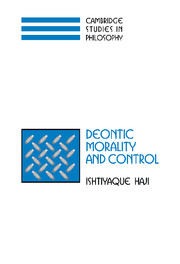Book contents
- Frontmatter
- Contents
- Acknowledgments
- 1 Introduction
- PART ONE DETERMINISM AND DEONTIC MORALITY
- PART TWO INDETERMINISM AND DEONTIC MORALITY
- PART THREE CONSEQUENCES OF BEING DEPRIVED OF DEONTIC ANCHORS
- 9 The Significance of the Possibility of Being without Deontic Anchors
- 10 Determinism, Deontic Anchors, and Appraisability
- 11 Virtue Ethics without Metaphysical Freedom
- 12 On the Connection between Morality's Dethronement and Deontic Anchors
- 13 Concluding Remarks
- Notes
- Glossary and List of Principles
- References
- Index
13 - Concluding Remarks
Published online by Cambridge University Press: 23 July 2009
- Frontmatter
- Contents
- Acknowledgments
- 1 Introduction
- PART ONE DETERMINISM AND DEONTIC MORALITY
- PART TWO INDETERMINISM AND DEONTIC MORALITY
- PART THREE CONSEQUENCES OF BEING DEPRIVED OF DEONTIC ANCHORS
- 9 The Significance of the Possibility of Being without Deontic Anchors
- 10 Determinism, Deontic Anchors, and Appraisability
- 11 Virtue Ethics without Metaphysical Freedom
- 12 On the Connection between Morality's Dethronement and Deontic Anchors
- 13 Concluding Remarks
- Notes
- Glossary and List of Principles
- References
- Index
Summary
Being deprived of deontic anchors does exact serious costs. I have discussed some of these in the past few chapters. One is that, without deontic anchors, there would be no grounds for reactive attitudes such as resentment and forgiveness. A second is that, in the absence of deontic anchors, deontic appraisals of rightness, wrongness, and obligatoriness would lack propriety. A third cost is affiliated with concerns of overridingness. If the moral “ought” is overriding, and its verdict is definitive in settling what one plain ought to do in situations in which different sorts of obligation conflict, we will be dispossessed of this ultimate standard of appeal if there are no deontic anchors. One might be, as I am, skeptical about morality's being overriding. Determinism, though, threatens overridingness itself in another way. As I explained, the Overridingness Thesis presupposes the existence of an overarching standard, “Reason,” that passes judgment on the relative normative stringency of special standards of obligation such as moral or prudential obligation. The “plain ought” dictates of Reason, it seems, just like those of the deontic moral “ought,” require alternative possibilities. But if this is so and determinism effaces alternative possibilities, determinism would undermine plain “ought” prescriptions as well.
In this chapter, I first single out an additional cost of being deprived of deontic anchors: In a world devoid of such anchors, we are not, in a way to be explained, “sources” of deontic morality.
- Type
- Chapter
- Information
- Deontic Morality and Control , pp. 245 - 251Publisher: Cambridge University PressPrint publication year: 2002



